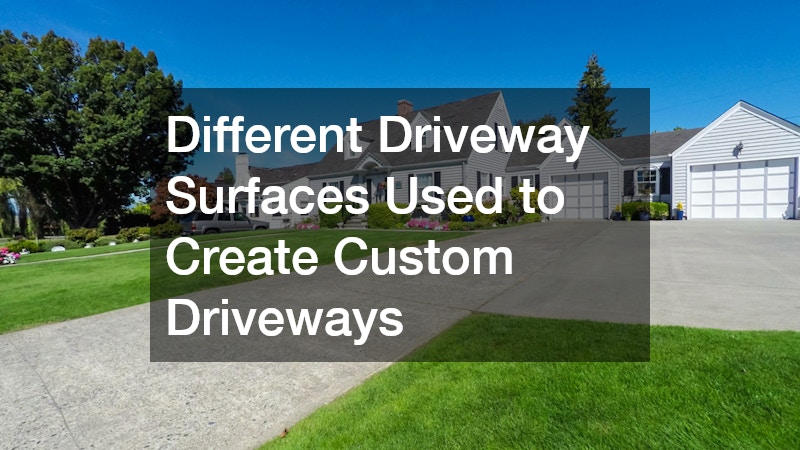Custom driveways are more than just a path to your garage—they’re a statement of style, functionality, and personal taste. In today’s home improvement landscape, homeowners are increasingly opting for custom driveways to elevate their property’s exterior. These tailored surfaces not only provide practical access but also blend seamlessly with architectural designs, landscapes, and individual preferences. The variety of materials available for custom driveways is vast, allowing for endless creativity.
From sleek modern finishes to rustic charms, options like concrete, pavers, and gravel dominate the scene. Each material offers unique advantages in terms of durability, aesthetics, and cost, making custom driveways accessible for budgets big and small. Whether you’re aiming for a minimalist look or an intricate pattern, understanding these materials is key to crafting custom driveways that stand the test of time. As we delve deeper, we’ll explore popular choices, selection factors, benefits, and potential hurdles, helping you envision the perfect custom driveways for your home.
What are the Most Popular Surface Materials for Custom Driveways?
When designing custom driveways, selecting the right surface material is crucial for achieving both beauty and longevity. Among the top contenders are concrete, pavers, and gravel, each bringing distinct qualities to custom driveway projects.
Concrete: The Durable Choice
Concrete remains a staple for custom driveways due to its unmatched durability and versatility. This material can withstand heavy traffic, making it ideal for families with multiple vehicles or those in high-use areas. custom driveways made from concrete can be stamped, stained, or textured to mimic more expensive materials like stone or brick, offering endless design possibilities. Pros include low initial costs—typically ranging from $4 to $15 per square foot—and resistance to weathering when properly sealed. However, in colder climates, concrete custom driveways may crack from freeze-thaw cycles, requiring occasional repairs. Overall, concrete’s strength and adaptability make it a go-to for long-lasting custom driveways that balance form and function.
Pavers: Variety in Style
For those seeking aesthetic flair in their custom driveways, pavers provide unparalleled variety. Available in materials like brick, stone, or concrete blocks, pavers allow for intricate patterns, colors, and shapes that can complement any home style—from traditional to contemporary. custom driveways with pavers are permeable, promoting better drainage and reducing runoff, which is a boon for eco-conscious homeowners. Installation costs hover between $10 and $30 per square foot, reflecting the premium look. While pavers are durable and easy to replace individually if damaged, they may shift over time without proper base preparation, leading to uneven surfaces. The stylistic flexibility of pavers elevates custom driveways, turning them into artistic extensions of your property.
Gravel: Budget-Friendly and Rustic
Gravel offers a charming, rustic appeal for custom driveways, especially in rural or countryside settings. Composed of crushed stones, gravel, custom driveways are quick to install and highly affordable, often costing just $1 to $3 per square foot. They provide excellent drainage, preventing water pooling, and can be customized with different stone sizes and colors for a natural vibe. Maintenance involves occasional raking to redistribute stones, but gravel’s permeability makes it environmentally friendly. Drawbacks include potential for dust in dry weather and the need for edging to contain the material. Despite these, gravel’s simplicity and cost-effectiveness make it a popular choice for custom driveways that prioritize ease and affordability.
How Do You Choose the Right Material for Your Custom Driveway?
Selecting materials for custom driveways involves careful consideration to ensure they meet your needs and the environment.
Assessing Climate and Environmental Considerations
Climate plays a pivotal role in material choice for custom driveways. In regions with harsh winters, avoid materials prone to cracking like unsealed concrete; opt for flexible pavers instead. For wet areas, permeable gravel or pavers in custom driveways help manage water flow, reducing erosion and flooding risks. Environmental factors, such as soil stability, also matter—soft soils may require reinforced bases for all custom driveways types.
Balancing Budget and Aesthetic Preferences
Budget and style must align when planning custom driveways. High-end pavers suit those desiring luxury aesthetics, while budget-savvy homeowners might prefer gravel’s rustic charm. Concrete offers a middle ground, customizable without breaking the bank. Prioritize what matters most: visual impact or cost savings in your custom driveways design.
Considering Maintenance and Longevity
Longevity and upkeep are essential for sustainable custom driveways. Concrete demands minimal maintenance but periodic sealing; pavers need weed control between joints; gravel requires replenishing every few years. Choose based on your willingness to invest time—low-maintenance options like sealed concrete ensure custom driveways endure for decades.
What are the Benefits of Customizing Your Driveway Design?
Customizing custom driveways yields rewards that extend beyond the surface.
Enhancing Curb Appeal
Custom driveways instantly boost your home’s first impression. A well-designed surface with unique patterns or colors draws the eye, making your property stand out in the neighborhood and reflecting your personal style.
Increasing Property Value
Investing in custom driveways can yield a strong return. Real estate experts note that upgraded driveways add to resale value, often recouping 50-75% of costs by appealing to buyers seeking move-in-ready exteriors.
Personalizing Your Home’s Exterior
Custom driveways allow for true personalization, integrating elements like borders, inlays, or eco-features that match your lifestyle, turning a functional space into a bespoke extension of your home.
What are the Challenges in Building Custom Driveways?
While rewarding, constructing custom driveways comes with obstacles.
Costs and Budgeting Issues
Expenses can escalate in custom driveways projects, from material prices to unexpected site prep. Budget overruns are common, so detailed planning and quotes are essential to keep costs in check.
Dealing with Zoning and Legal Restrictions
Local regulations may dictate custom driveways’ sizes, materials, or permeability for environmental compliance. Navigating permits and zoning laws requires research to avoid fines or redesigns.
Finding Skilled Contractors for Custom Work
Securing experienced professionals for custom driveways is ke,y but challenging. Look for certified installers with portfolios to ensure quality craftsmanship and avoid subpar results.
In summary, custom driveways merge functionality with aesthetic appeal, transforming ordinary entrances into standout features. By selecting the right materials—like durable concrete, stylish pavers, or rustic gravel—and weighing factors such as climate, budget, and maintenance, you can create custom driveways that enhance your home’s value and charm. Despite challenges like costs and regulations, the benefits of personalized custom driveways far outweigh the hurdles.

